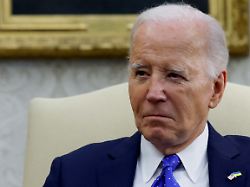The economy is showing historic strength, analysts are cheering, wages are rising – but voters have no trust in US President Biden. Why is that?
The people of the Middle East have been drinking from the cup of life for months, but they don’t notice it. President Joe Biden and his colleagues point this out again and again, but they are largely ignored. The US economy is growing. Wage growth is outpacing inflation. People are buying heavily. But many people talk about crisis. How can that be?
Most Americans are pessimistic about their economy and therefore their own future. Nevertheless, people do not prefer to hold on to their money like in earlier times of doubt, but are currently spending it as if they were particularly optimistic. It is a special situation in a very special presidential election year, in which there will most likely be a new duel between Biden and his predecessor Donald Trump in November.
According to interviews across all social classes, Americans are afraid writes the Wall Street Journal. They fear an unpredictable world where no one in government or business is competent enough to steer the country through turbulent times. “Even though I’m fine right now, I feel like it could all be over in a second,” one woman is quoted as saying. Many fear that their better situation is not sustainable but is threatened by political circumstances.
Unemployment in the United States has been below four percent for two years, which was last seen in the 1960s. Inflation, which rose to over 9 percent after the start of Russia’s war of aggression in Ukraine, has calmed down again and is at 3.1 percent in January fallen. It has only been lower once in the past three years. Energy prices have been getting cheaper for months. In short: if economists’ past experiences are the benchmark, the data and people’s behavior do not match.
Economists cheer, voters don’t
Biden’s campaign team is still trying to continue to promote “Bidenomics”, i.e. a social market economy in the spirit of the middle class, which, according to Democrats, is responsible for the upswing: support the low-wage sector, expand the middle class, and government investments for the future, for example with infrastructure and education to promote competition and reduce tax evasion as much as possible with additional staff.
This isn’t just politics. At the end of January, analysts were excited about the 2023 US economic report. The way the US government avoided an expected recession and instead achieved broad growth of 3.1 percent combined “the best of both worlds,” said the chief economist of EY-Parthenon: “It is the holy grail of non-inflationary growth.” The economy is making decent progress and inflation is moving closer to the Federal Reserve’s target. “Most people thought it was impossible,” a senior economist at UBS Global Wealth Management told the New York Times: “Even optimists weren’t that optimistic.” Moody’s Analytics chief economist enthused: “It’s just the perfect report.”
But instead of considering Biden particularly competent when it comes to the economy or otherwise applauding him, he is unpopular. The Democrats would prefer to have another presidential candidate, but they don’t know who and, if so, how they should do it. The Republicans are glorifying Trump’s pre-pandemic economic situation and want a tougher approach to migrants coming across the southern border. 33 percent of voters said in one Opinion poll from NBC that Biden could take care of the economy better than Trump. At the same time, 55 percent said that Trump was ahead of the president when it came to economic competence.
For Biden’s election prospects, this means that the state of the economy may have less of an impact on his election chances than with previous presidents who ran for re-election. A lot depends on the sympathy for a party; studies have found that voters are more critical of presidents of the other party. The effect is particularly strong among Republicans. “For MAGA, it’s the culture, stupid,” was the headline of an author on the US news site “The Hill”, echoing “It’s the economy, stupid”, the commonplace of all US election campaigners.
Three years of crisis in the bones
Although the mood among consumers has recently brightened significantly, with the highest two-month improvement since 1991, it is still 20 percent lower than at the beginning of 2020 under then-President Trump. Then the pandemic came. The Wall Street Journal compares that the current figures are at the end of a recession, not solid growth.
A look back at the year Biden moved into the White House. The newly sworn-in president’s first goal from January 2021 was to get Covid under control. His enormous relief package ushered in his honeymoon with voters. But first because of supply chain problems and then because of the war in Ukraine, prices rose more than incomes for two years. People had less and less in their pockets while the Democratic government patted itself on the back for its economic policies. Only since mid-2023 have wages grown at least slightly more than prices. People immediately buy more, even on credit. In the last quarter of 2023, they took on more debt on their credit cards than they had in 20 years.
The consequences of Covid and the war in Europe are apparently still in the minds of US voters. Their purchasing power shrank for over two years. It is still lower than before because most prices remain the same. It’s no wonder that people don’t trust the improved situation so far; For too long, wallets were always a little lighter than the previous month. Rebuilding that trust takes time. And obviously longer than the Democratic campaigns would like.
